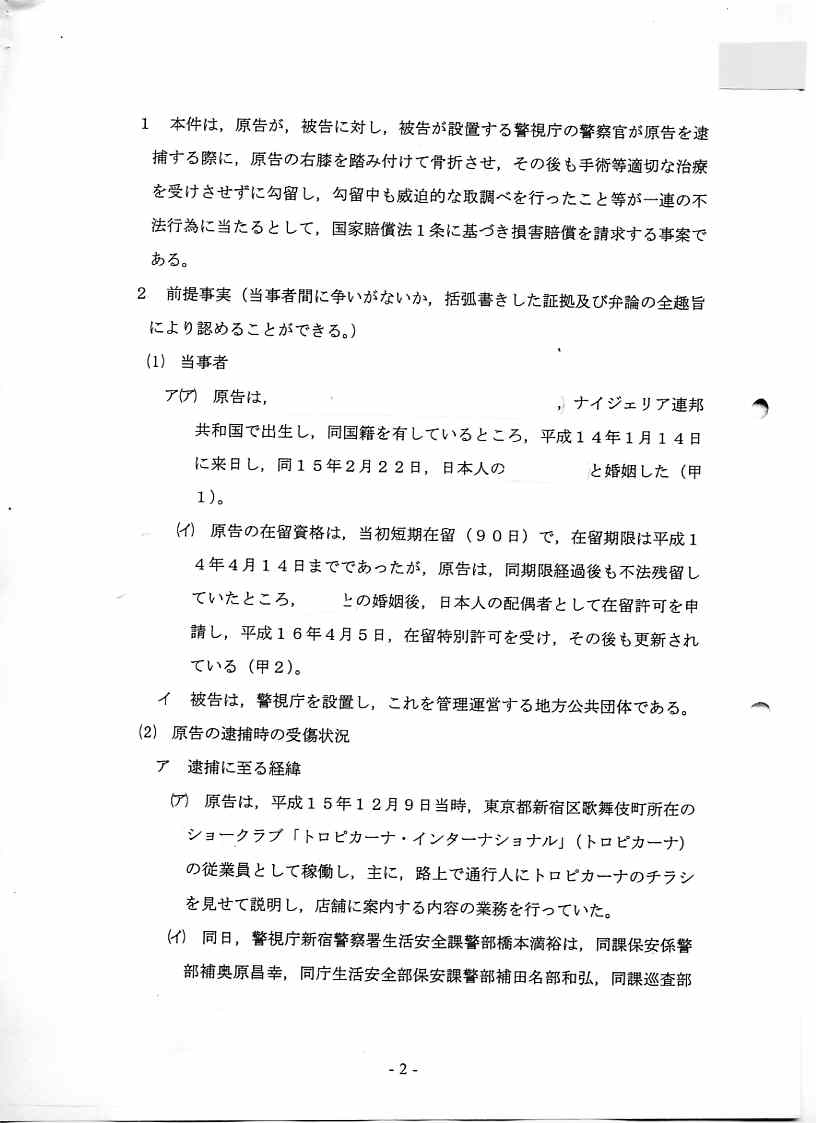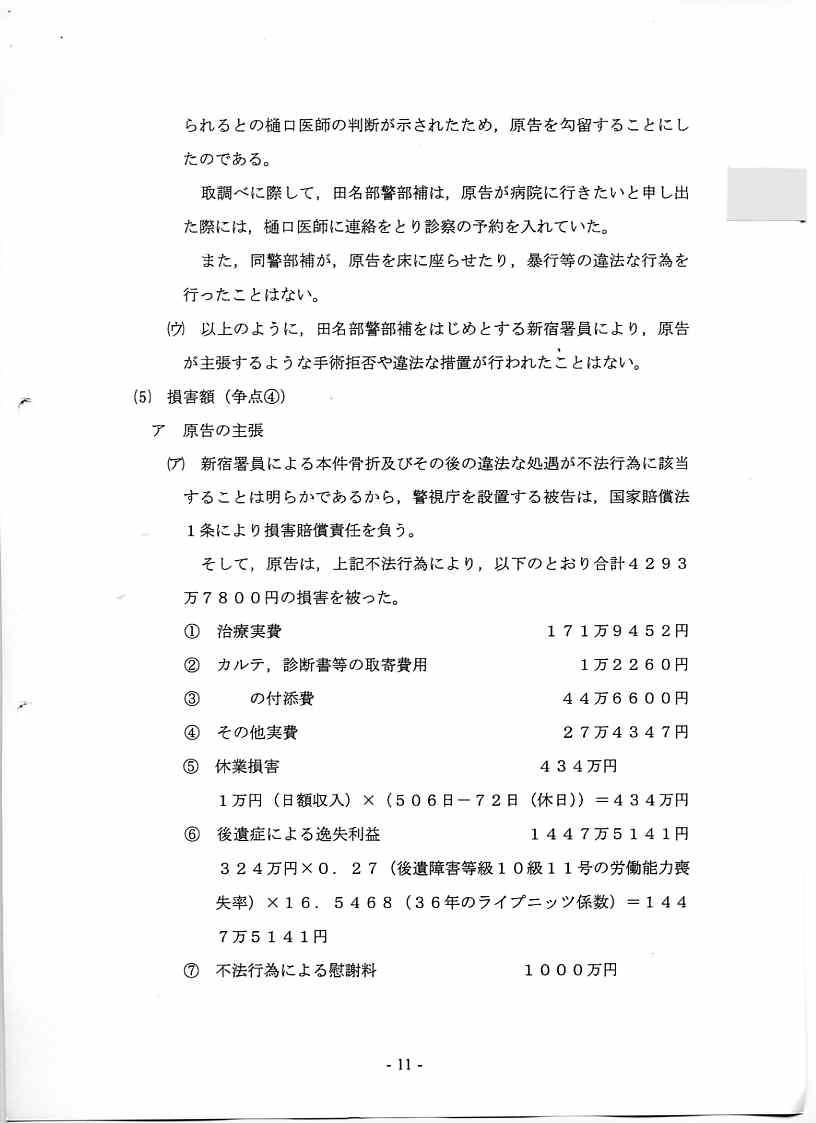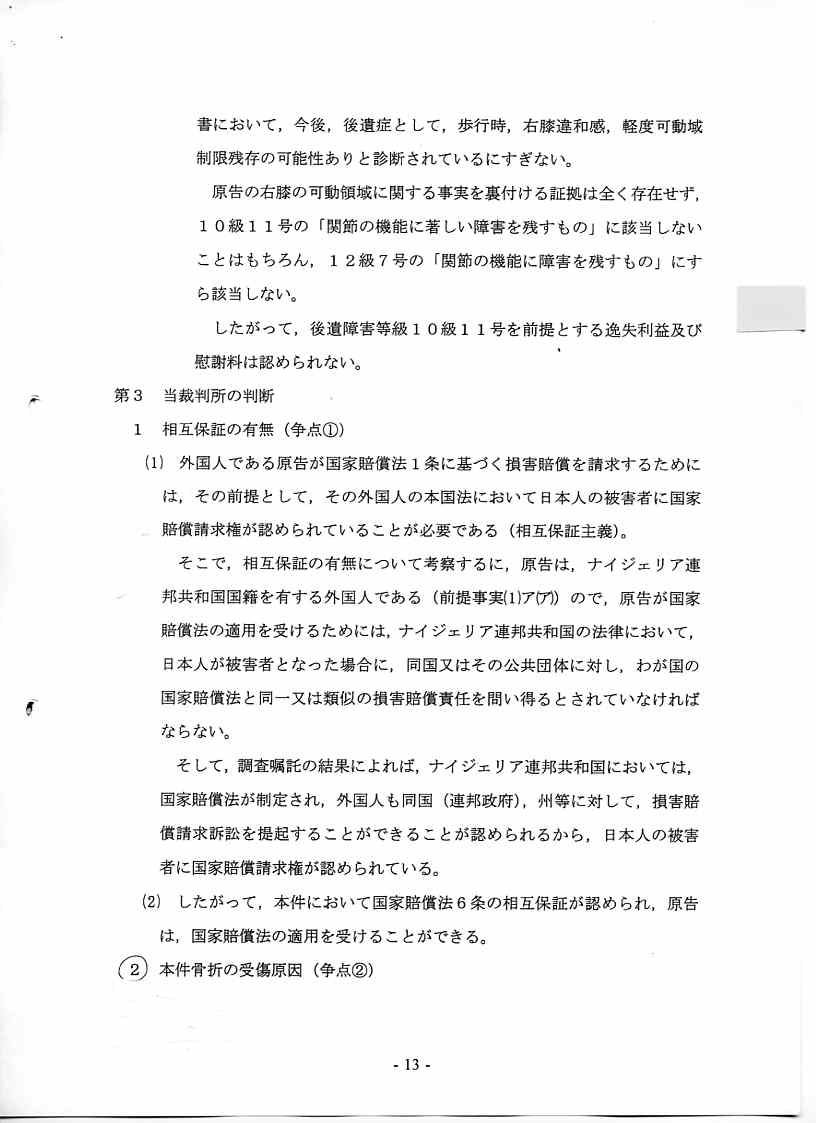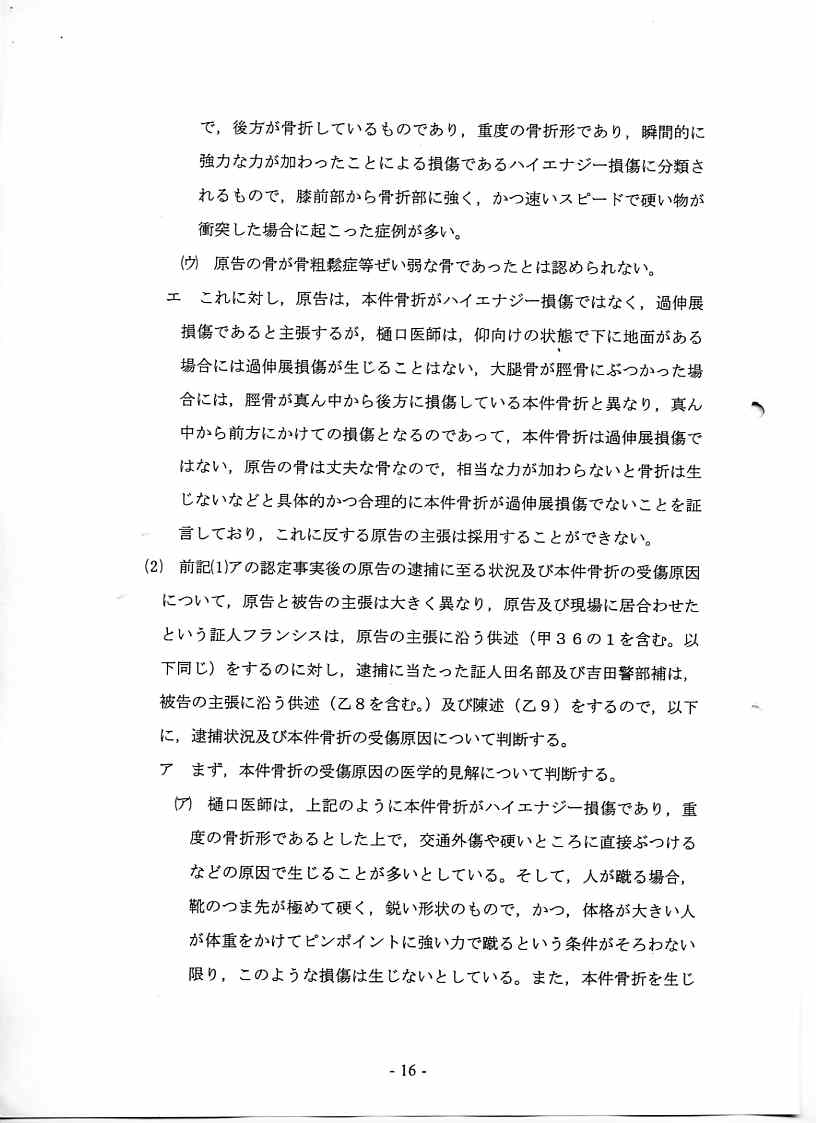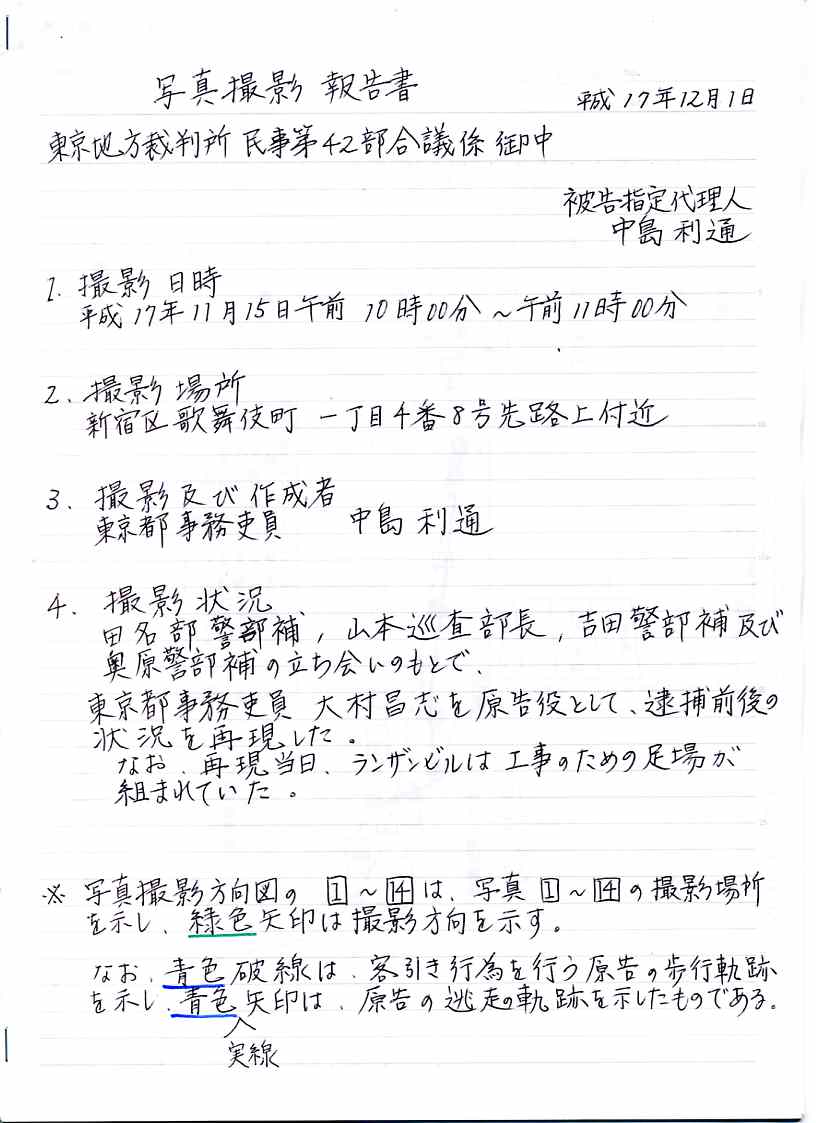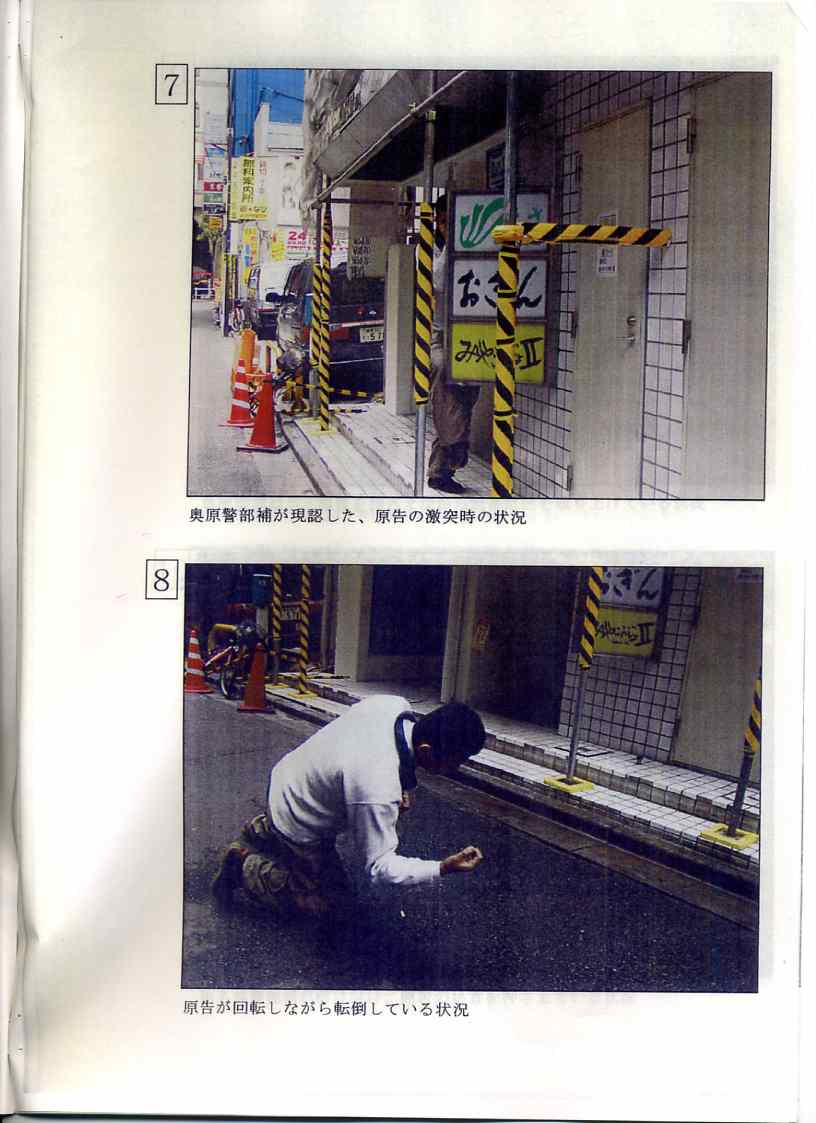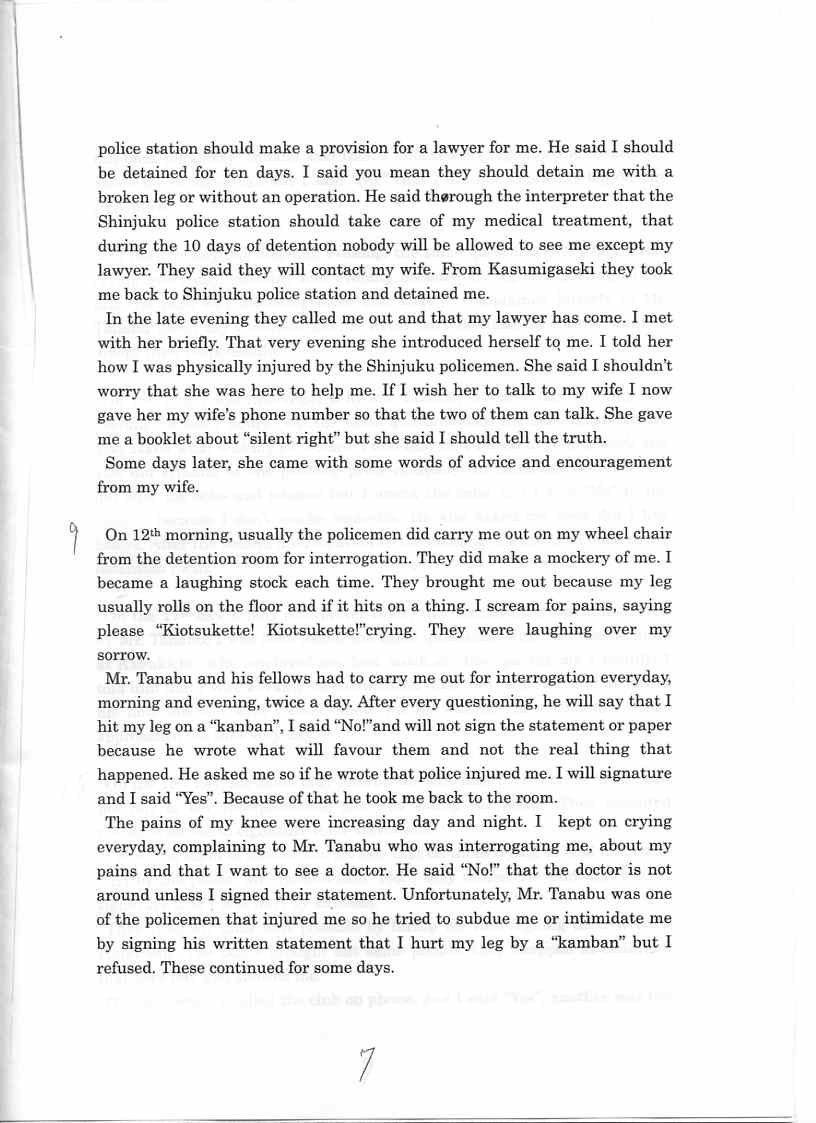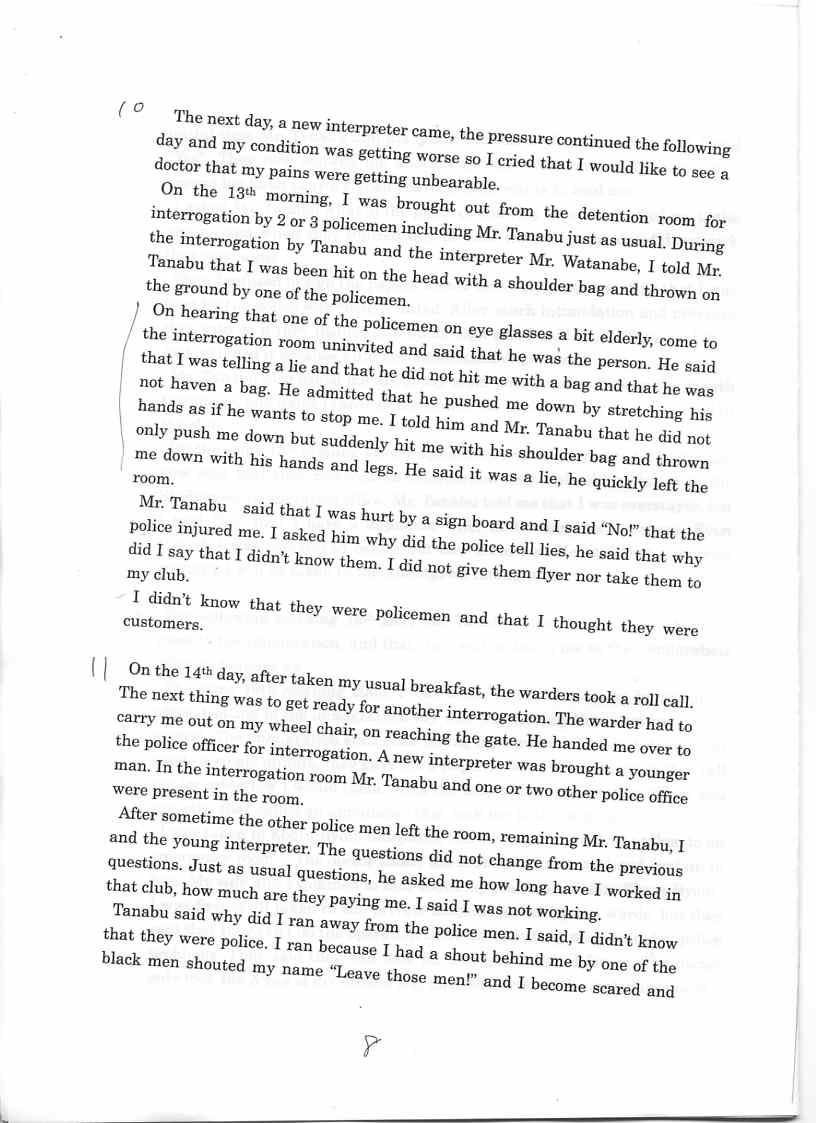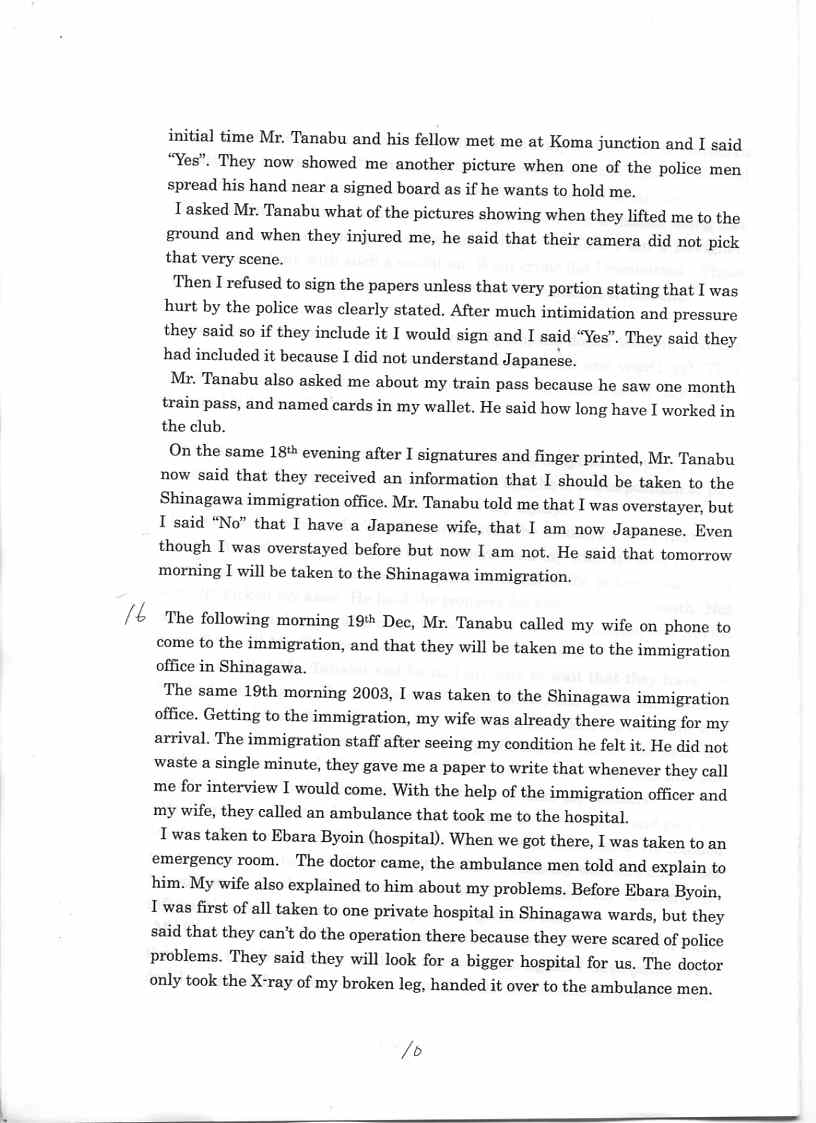"WE CAN'T TRUST THE TESTIMONY OF BLACK PEOPLE"
ANOTHER CASE OF JUDICIAL MISCARRIAGE
A NIGERIAN INJURED AND CONTAINED IN J POLICE CUSTODY
LOSES HIS LAWSUIT AGAINST THE NATIONAL POLICE AGENCY
Report by ARUDOU Debito, Sapporo, Japan
debito@debito.org,
http://www.debito.org
Freely forwardable
Released July 15, 2007
This post is organized thusly:
SUMMARY
WHY THIS CASE MATTERS TO DEBITO.ORG
FACTS AND ASSERTIONS OF THE CASE
CONCLUSIONS
////////////////////////////////////////////////////////////
SUMMARY:
According to court records, on December 9, 2003, UC Valentine, a
Nigerian citizen working in Kabukicho, Shinjuku, Tokyo, was questioned
by plain-clothes police on suspicion of violating laws forbidding the
distribution of hand-held billets to passersby. Eventually a
scuffle ensued in a narrow alley, where a melee of police and touts
wound up with an injured Valentine being pinned to the ground by
several police. Plaintiff Valentine claims that he was assaulted
while being restrained, by a cop who repeatedly kicked Valentine's leg
so hard that it broke below the knee. The police claim that
Valentine injured himself, running away and crashing knee-first into an
elevated bar sign attached to the alley wall. In any case,
Valentine was apprehended and interrogated for ten days, denied
hospitalization or adequate medical treatment for the interim.
Consequently, his leg injury became so medically traumatized that it
required complex hospital operations. To this day Valentine
remains physically impaired and in constant pain. In 2005,
Valentine sued the NPA for damages and hospital bills totaling
42,937,800 yen in Tokyo District Court, but lost his case on March 29,
2007. Inter alia, the court ruled that not only was a doctor's
expert testimony about Plaintiff's crippling injuries merely "a sense,
not based on rational grounds", but also that a witness's testimony was
inadmissible because he is African. Clearly there is an emerging
pattern of differing standards for non-Japanese claimants in Japanese
courts.
The case is currently on appeal in the
Tokyo High Court. First hearing on Tuesday, July 17, 2007, Tokyo
Koutou Saibansho 8F, Rm 808, 1:30PM. Attend if you want.
////////////////////////////////////////////////////////////
Heisei 17 (wa) Dai 17658, Tokyo District Court, Civil Court Dai 44-Bu
Plaintiff: UC VALENTINE
Defendant: Tokyo Municipal Government (Tokyo-to), Governor ISHIHARA Shintaro et al.
Tokyo District Court decision full text in Japanese at
http://www.debito.org/valentinelawsuit.html
NPA's fishy photo testimony of what happened at
http://www.debito.org/valentinelawsuit.html#NPAtestimony
Plaintiff Valentine's testimony in English
http://www.debito.org/valentinelawsuit.html#etestimony
////////////////////////////////////////////////////////////
WHY THIS CASE MATTERS:
Setting aside any "he-said, she-said" doubts about different recall of
the facts of the case, both parties agree that Valentine was detained
in police custody for ten days without hospitalization. This
caused his medical condition to worsen to the point of
debilitation. This was not, however, seen by the judiciary as
something the police should take any responsibility for.
As far as Debito.org goes, from a judicial standpoint this case is also
of great concern due to differing standards for evidence based upon
nationality. The judge, when dismissing the case, actually goes
so far as to say (page 19) that testimony of a witness for Valentine
(who vouches for his version on the police breaking his leg) cannot be
trusted because it is "from the Black Community". To quote:
===============================
"In light of the fact that the witness
has been acquainted with the Plaintiff , visiting him in hospital after
his leg was broken, and is a friend of quite some closeness, and the
fact that they associated with each other within the Black Community in
Kabukichou, witness Francis's testimony as an eyewitness account is not
something we can see as having objectivity, and as such cannot possibly
believe."
"shounin wa, juuzen kara genkoku to
menshiki ga ari, honken kossetsu go mo genkoku o byouin wo mimatteiru
nado kanari shitashii koto ga ukagatteiru yuujin de ari, kabukichou no
kokujin no komyunitei no nakama de atta koto tou o terasu to, shounin
Furanshisu no kyoujutsu wa, mokugeki shougen to shite kyakkansei o
yuusuru mono to wa iezu, kono mama shinyou suru toutei dekinai"
http://www.debito.org/valentinelawsuit.html#19
===============================
Hm, try disqualifying a person's testimony because he's a member of a
Black Community (not to mention because he is a friend who visits the
Plaintiff in hospital), and see how that gets you in the judiciary of
most of the world's other developed countries. Moreover, the
accounts of other police officers are not similarly called into doubt
for having too much closeness in their own "community".
I've seen this sort of thing before. Check out the cracked judge
in the McGowan Case of 2006, where the Plaintiff (an African-American)
was refused entry by an eyeglass shop expressly because the shopkeep
"hates black people". There, Osaka District Court Judge Saga
Yoshifumi ruled against the gaijin there too. Inter alia, McGowan
and his Japanese wife's eyewitness accounts were deemed insufficient
due to an alleged language barrier. Full details on that case
(starting with a Japan Times article) at
http://www.debito.org/mcgowanhanketsu.html#japantimesfeb7
In this case, presiding Judge Sugiyama et al go one better, and say that because they are black they are thick as thieves...
It's one of the reasons we are seeing cases of suspects escaping
overseas because they believe they're going to get a raw deal in a
Japanese court due to their foreignness.
http://www.debito.org/index.php/?p=361
I have no sympathy for wanted criminals, of course, but neither the
McGowan nor the Valentine Cases are criminal cases. And still
they got raw deals--court defeats. Due to a different set of
judicial standards applied to foreigners than to Japanese. Adding
these cases to the collection.
////////////////////////////////////////////////////////////
FACTS AND ASSERTIONS OF THE CASE
(based upon the court decision and with Valentine's claims)
On December 9, 2003, UC Valentine (born 1972 and married to a Japanese
from 2002) was working his shift as a show club distributing pamphlets
to potential clients. In the early evening, he was approached by
two plain-clothes officers who appeared to Valentine to be customers
(Valentine asserts that they did not identify themselves as police
until a melee ensued).
Minutes later, in a narrow alleyway close to the show club, other
members of the Black Community shouted repeatedly to Valentine, "Leave
them!", apparently aware that they were either police or yakuza.
What happens next depends on the side of the courtroom you're sitting,
but in any case, due either to panic (Valentine) or guilt (police),
Valentine fled, then found himself being restrained by three cops on
the ground in the alleyway. He was arrested on suspicion of
violating the Entertainment and Amusement Trades Control Act (Fuueihou)
Art. 22 Sec. 1 for distributing nightlife pamphlets on the street.
Somewhere in this scuffle Valentine's right leg was broken below the
knee. Valentine's version (as was his eyewitness's, unfortunately
Black) is that a police officer named Tanabu kicked him several times
in the knee, even while the former was being restrained by two other
cops. The cops say (in photo-reenacted evidence shown to me in
person by Valentine and his wife on April 26, 2007, and scanned at
Debito.org at
http://www.debito.org/valentinelawsuit.html#kneebash
) that when Valentine fled, he crashed into a metal sign (jutting out in a triangle from the wall) knee first, breaking his leg.
What's fishy about this story is when you look at the photograph, the
sign is actually on a wall 23 cms high, with a sidewalk below it
showing a raised curb and two steps. Valentine was nimble enough
to avoid tripping over three steps, but somehow not nimble enough to
avoid the sign. When you consider that this happened on a
December 9 around 8PM, when the sign is likely to be lit and the steps
in shadow, it is odd that the more visible object is the thing
Valentine allegedly crashed into.
Also odd is that if he crashed into the sign knee-first, it should have
broken his knee, not the bone below his knee. However, the police
apparently confiscated Valentine's pants for analysis, and after some
time finally returned them with no report on whether or not there were
traces of footprint.
Valentine was held in police custody between December 9 and 19, 2003,
and, despite being put into a cast, given no access to a
hospital. According to his testimony (
http://www.debito.org/valentinelawsuit.html#etestimony),
he claims that police interrogation involved quid pro quos--access to
painkillers and his wife in exchange for signing documents, one a
statement stating inter alia that the police did not injure him.
On Day 10 of his interrogation, once the clause about injury was
eliminated, Valentine signed and was turned over to Immigration, who
called an ambulance and hospitalized him at Ebara Byouin, Tokyo,
immediately. His leg was apparently busted up so badly (a case
the doctor who treated him, whose testimony was entered into the court
record (page 17 (i)), said he had never seen the likes of before) that
it required rib bone transferal to the area at great time and expense.
Situations like these in Japanese custody have come under fire in 2007
by the United Nations Committee Against Torture. See
http://www.debito.org/index.php/?p=494
////////////////////////////////////////////////////////////
WHY THE COURT REJECTED VALENTINE'S SUIT
In addition to dismissing the eyewitness testimony due to being members
of the wrong ethnic community, the decision makes two singularly
interesting points, also indicative of this court's odd standards of
evidence:
1) In order for a foreigner to sue the State of Japan, the foreigner's
home country laws must also cover a Japanese in the same situation in
that country (page 13 3.1 (1)). I'm not a lawyer, but I would
have thought that Japan's laws apply to everyone equally, including
foreign residents, regardless of their country of origin.
Fortunately, the judges rule that Valentine's Nigerian citizenship does
not void his ability to sue the State.
2) Despite acknowledging the expertise of Valentine's examining doctor
at Ebara Byouin, the judges dismiss their medical testimony as merely
"a sense" (kankaku teki), not "rational grounds" (gouriteki na
konkyou--page 17 (i)). The judges even decide (in their somehow
professional medical opinion, on page 15 u (a)) that Valentine's leg
didn't get that much worse while in custody. Then they even judge
on their own recognizance (page 16 item e) that Valentine's bones are
strong--so he must have run into that sign pretty hard to hurt
himself. After all, shoes, they say, inflict "pinpoint injuries",
and Tanabu's "rubber shoes" wouldn't cause the injuries that Valentine
suffered (page 16 a (a)). Shoes are apparently incapable of
stomping from the heel, I guess.
////////////////////////////////////////////////////////////
CONCLUSIONS
There are other fine points, such as who did what to whom with what,
and whether people were running slow or fast, but never mind. The
point still remains that Valentine was crippled due to a sustained lack
of medical attention, and what kept him from that were the Kabukichou
Police.
The responsibility for this is not discussed adequately in the decision
(judges assert that an X-ray, a cast, disinfection, and draining blood
from the joints performed on the first day of incarceration were
somehow medically sufficient (page 22 3 (1) i (a) onwards)--even were
the best that could be done in a non-life-threatening situation given
the fact that he was in custody. Therefore nothing illegal
happened. Regardless of the fact that Valentine still wound up
crippled, for reasons his doctor says was due to prolonged medical
inattention.
Even if Valentine had not been crippled by the police (instead, say,
stabbed in the leg by a criminal), would these dangerously temporary
measures still be legal? Quite probably. Which means the
NPA's clear negligence for the welfare of the incarcerated, plus the
judiciary's unwillingness to force them to take responsibility when
something goes wrong, is damning evidence of the unaccountability
within Japan's criminal justice system.
Couple that with a court willing to use any pretext possible to
discount the victim's standpoint, including overruling doctors and
dismissing testimony by nationality, and you have a police force which,
increasingly clearly, can deal with foreigners any way they like with
impunity.
Arudou Debito
Sapporo, Japan
debito@debito.org
http://www.debito.org
July 15, 2007
REPORT ON VALENTINE LAWSUIT ENDS

